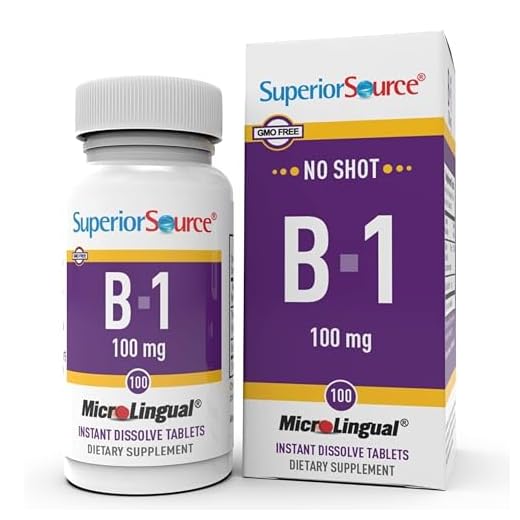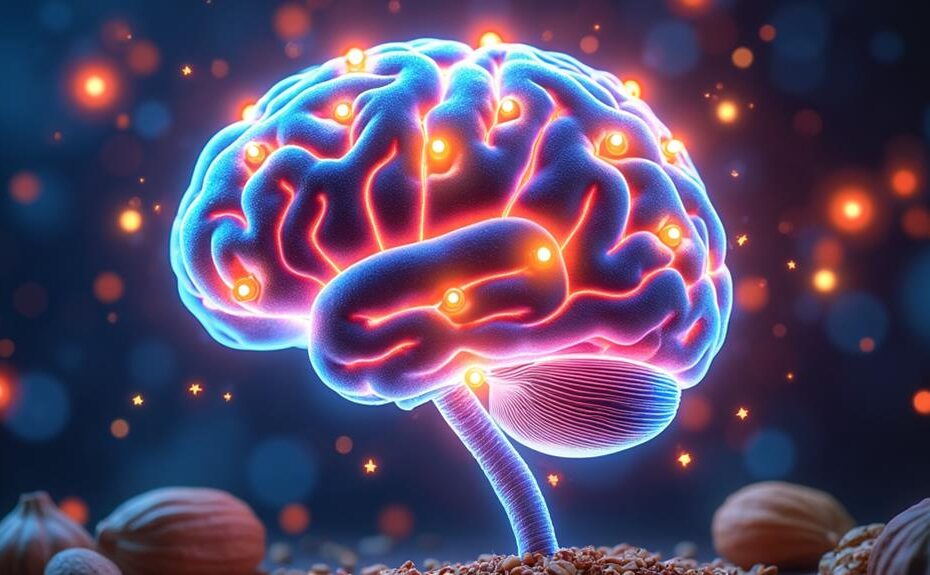







Vitamin B1, or thiamine, supports your brain function by converting carbohydrates into glucose, the energy source your brain relies on. It enhances nerve signal transmission, ensuring effective communication within your body. A deficiency can lead to significant cognitive impairments, including memory loss and confusion, as glucose metabolism may decline by 20-30%. Furthermore, thiamine plays a critical role in synthesizing neurotransmitters like acetylcholine, impacting your mood and cognitive performance. Supplementing thiamine can improve memory and overall brain health, hinting at the importance of maintaining adequate levels for ideal cognitive function in various populations. Explore more about its benefits.
Key Takeaways
- Vitamin B1 (thiamine) is essential for converting carbohydrates into glucose, providing vital energy for brain function.
- It aids in nerve signal transmission, facilitating effective communication within the nervous system.
- Thiamine deficiency can lead to cognitive impairments and a significant decline in glucose metabolism, resembling symptoms of Alzheimer's disease.
- Adequate thiamine levels are crucial for the synthesis of neurotransmitters, particularly acetylcholine, enhancing cognitive performance and mood regulation.
- Supplementation of thiamine may improve glucose metabolism and cognitive function, particularly in individuals with neurological disorders.
Role of Vitamin B1 in Brain Health
Vitamin B1, or thiamine, plays an indispensable role in brain health by converting carbohydrates into glucose, the brain's primary energy source. This process is fundamental for supporting overall brain function and cognitive processes. When you have adequate thiamine levels, your brain can effectively metabolize glucose, ensuring that energy is available for synaptic activity and cognitive tasks. Additionally, Vitamin B1 supports nerve signal transmission, which is essential for efficient communication throughout the body.
However, thiamine deficiency can lead to significant cognitive deficits and neurological disorders. One severe manifestation of this deficiency is Wernicke-Korsakoff syndrome, characterized by memory deficits and confusion. Chronic low levels of thiamine can reduce glucose metabolism in the brain by 20-30%, impairing your cognitive abilities. Thiamine-dependent enzymes, such as pyruvate dehydrogenase and alpha-ketoglutarate dehydrogenase, are critical for maintaining proper brain metabolism and energy production.
Supplementing with thiamine could improve cognitive function and even reverse deficits, as shown in animal studies. This suggests that ensuring adequate thiamine intake is necessary for peak brain health and may hold therapeutic benefits for conditions like Alzheimer's disease. By prioritizing thiamine in your diet, you can help safeguard your cognitive well-being.
Thiamine Deficiency and Cognitive Effects
When thiamine levels drop, you might experience cognitive effects that can considerably impact your daily life. Thiamine deficiency can lead to significant cognitive impairments, including memory loss and confusion, as commonly seen in Wernicke-Korsakoff syndrome, which presents severe neurological symptoms. This deficiency also mirrors cognitive impairments associated with Alzheimer's disease, suggesting a potential shared pathway that disrupts brain function. Additionally, Vitamin B-1 supports proper digestion and enhances nutrient absorption, which may further influence brain health. Research indicates that chronic thiamine insufficiency is linked to a 20-30% reduction in glucose metabolism in the brain, an essential process for maintaining cognitive functions and overall brain health. In individuals with Alzheimer's, studies show a higher transketolase activity indicating functional thiamine deficiency, along with a notable 33% reduction in plasma thiamine levels.
Animal studies further emphasize the importance of thiamine, as early administration has been shown to reverse cognitive deficits, highlighting its potential in preventing and managing cognitive decline. Understanding these cognitive effects of thiamine deficiency is vital for safeguarding your brain health and addressing any memory-related concerns effectively.
Mechanisms of Glucose Metabolism
Cognitive impairments linked to thiamine deficiency highlight the significance of glucose metabolism in brain function. Vitamin B1, or thiamine, is essential for the activity of thiamine-dependent enzymes like pyruvate dehydrogenase and alpha-ketoglutarate dehydrogenase. These enzymes play fundamental roles in converting glucose into energy, which is critical for maintaining brain health. Micro Ingredients Vitamin B1 provides a high-quality source of thiamine that supports these processes. When you experience thiamine deficiency, glucose metabolism can decline by 20-30% in various brain regions, increasing the risk of cognitive impairments and neurological issues.
Impaired glucose metabolism is a notable characteristic of Alzheimer's disease, and processes reliant on thiamine are integral for synaptic activity. Often, diminished glucose metabolism occurs before clinical symptoms of Alzheimer's manifest, indicating a direct relationship between thiamine levels and cognitive decline. This underscores how important thiamine is for neuronal health.
Fortunately, thiamine supplementation can improve glucose metabolism in deficient states. By restoring thiamine levels, you may help reverse functional deficits in glucose utilization within the brain, ultimately supporting cognitive function and enhancing overall brain health. Understanding these mechanisms can empower you to make informed choices about your nutritional intake.
Thiamine's Impact on Neurotransmitters
Thiamine plays an essential role in the synthesis of neurotransmitters, particularly acetylcholine, which is important for memory and cognitive functions. This vitamin is vital for converting carbohydrates into glucose, providing the energy neurons need to produce neurotransmitters effectively. When you're deficient in thiamine, it can lead to reduced levels of neurotransmitters, contributing to cognitive deficits and conditions such as Wernicke-Korsakoff syndrome.
Research shows that maintaining adequate thiamine levels is linked to improved mood regulation and cognitive performance, thanks to its impact on neurotransmitter balance. Furthermore, thiamine supplementation has demonstrated potential in enhancing cognitive function and reducing memory impairment symptoms by supporting neurotransmitter activity in the brain.
Link Between Thiamine and Alzheimer's Disease
Research has increasingly highlighted the connection between thiamine deficiency and the progression of Alzheimer's disease (AD). Thiamine deficiency is linked to cognitive decline and neurological issues, both of which are hallmark features of AD. You might find it interesting that cognitive impairments in AD share similarities with memory defects seen in Wernicke-Korsakoff syndrome, conditions worsened by low thiamine levels.
In individuals with Alzheimer's, reduced activity of thiamine-dependent enzymes leads to impaired glucose metabolism, vital for maintaining cognitive function. This metabolic dysfunction is often observed in AD patients. Studies have shown that thiamine supplementation could improve glucose metabolism and cognitive function, suggesting a potential therapeutic role in managing Alzheimer's.
Furthermore, chronic thiamine insufficiency may encourage the formation of amyloid plaques and neurofibrillary tangles, which are characteristic of Alzheimer's pathology. By addressing thiamine deficiency, you may help combat some of the cognitive decline associated with AD. Overall, maintaining adequate thiamine levels could be significant for brain health, particularly in those at risk for or already experiencing Alzheimer's disease.
Symptoms of Thiamine Deficiency
When your body doesn't get enough thiamine, you may start to notice a range of troubling symptoms that affect brain function. Thiamine deficiency can lead to neurological symptoms such as confusion, irritability, and memory problems, all of which indicate impaired cognitive performance. You might also experience fatigue and weakness, which can further decrease your energy levels and cognitive abilities.
In more severe cases, thiamine deficiency can result in Wernicke-Korsakoff syndrome, a serious condition characterized by encephalopathy, psychosis, and significant memory deficits. These symptoms can severely hinder your daily functioning and quality of life. Additionally, thiamine deficiency may manifest as a rapid heart rate and swelling, reflecting cardiovascular complications that can indirectly affect your brain health.
Research suggests a link between chronic thiamine insufficiency and cognitive decline, indicating that it may contribute to conditions like Alzheimer's disease through impaired glucose metabolism in the brain. Recognizing these symptoms early on is vital for addressing thiamine deficiency and supporting overall brain function. If you're experiencing any of these signs, it's important to consult a healthcare professional for appropriate evaluation and intervention.
Dietary Sources of Thiamine
Incorporating a variety of foods into your diet is vital for guaranteeing you get enough thiamine, or Vitamin B1, to support brain function. Whole grains like brown rice and oats are excellent dietary sources, providing significant amounts of thiamine necessary for ideal cognitive health. You should also consider legumes, such as beans and lentils, which are not only rich in thiamine but also contribute to your overall nutrient intake.
Animal products, particularly pork and certain fish like salmon and trout, stand out as among the best dietary sources of thiamine. These foods supply essential nutrients that help maintain brain metabolism. Nuts and seeds, especially sunflower seeds and almonds, can easily be added to your meals or snacks, offering beneficial amounts of thiamine to support your brain function.
Additionally, many fortified foods, such as cereals and breads, come enriched with thiamine, making it easier for you to meet your daily requirements for this vital nutrient. By including these diverse sources in your diet, you can guarantee that your brain gets the thiamine it needs to function ideally.
Recommended Thiamine Intake
Understanding the recommended intake of thiamine, or Vitamin B1, is fundamental for maintaining ideal brain health. The recommended thiamine intake varies by age and sex. Infants need between 0.2-0.3 mg, while children require 0.5-0.9 mg. Adult females should consume 1.1 mg, and adult males should aim for 1.2 mg daily. Pregnant and breastfeeding women have higher thiamine needs, with recommendations of 1.4 mg per day to support both maternal and fetal health.
As you age, you may require increased amounts of thiamine due to potential absorption issues, making adequate dietary intake even more important. Regular dietary intake of thiamine is essential for maintaining ideal brain function, as chronic deficiency can lead to cognitive impairments and neurological disorders.
To meet these daily requirements, focus on food sources rich in thiamine, such as whole grains, legumes, pork, and fortified cereals. By ensuring you consume a balanced diet rich in these foods, you can support your brain health and overall well-being effectively.
Thiamine Supplementation Benefits
Thiamine supplementation offers significant benefits for brain health, particularly in enhancing cognitive function and memory. This vitamin plays an essential role in glucose metabolism, which is crucial for maintaining mental clarity. Research shows that thiamine can improve glucose metabolism by 20-30% in brain regions, which is especially beneficial for Alzheimer's patients, helping to sustain synaptic activity and cognitive health.
Individuals with Wernicke-Korsakoff syndrome have experienced marked improvements in cognitive function and memory with thiamine supplementation, underscoring its significance in neurological recovery. Additionally, regular thiamine intake has been linked to reduced symptoms of cognitive decline, potentially offering a protective effect against neurodegenerative disorders.
Moreover, studies indicate that thiamine administration, particularly when combined with anti-inflammatory treatments, can promote neurogenesis and restore hippocampal function in those with thiamine deficiency. By supporting brain health through these mechanisms, thiamine supplementation not only enhances cognitive function but also plays an important role in preventing further cognitive deterioration. If you're looking to bolster your brain health, considering thiamine supplementation could be a beneficial step.
Future Research Directions on Thiamine
As researchers explore deeper into the intricate relationship between thiamine and brain health, future studies are likely to focus on its potential to combat cognitive decline, particularly in conditions like Alzheimer's disease. There's promising evidence suggesting that thiamine supplementation may enhance glucose metabolism in the brain, which could be essential for improving cognitive function in those experiencing thiamine deficiency.
Investigating the synergy between thiamine and anti-inflammatory treatments could reveal new pathways for promoting neurogenesis and recovery from neurological impairments tied to deficiency. Understanding the genetic and epigenetic mechanisms influencing thiamine's effects on brain health is significant, especially regarding neuronal survival and inflammation during deficiency.
Additionally, ongoing research may target at-risk populations, such as the elderly and those with alcohol use disorders, to evaluate thiamine supplementation's efficacy in preventing or treating cognitive impairments, including syndromes like Wernicke-Korsakoff. Future clinical trials might assess the long-term impact of thiamine administration on memory function and overall brain health across diverse demographics, particularly those with comorbid conditions affecting thiamine status.
Conclusion
In summary, vitamin B1 plays an essential role in supporting brain function by influencing glucose metabolism and neurotransmitter activity. For instance, consider a senior named Mary, who struggled with memory loss until she adjusted her diet to include more thiamine-rich foods. This change not only improved her cognitive health but also revived her enthusiasm for life. By ensuring adequate thiamine intake, you can help safeguard your brain health and potentially reduce the risk of cognitive decline.







